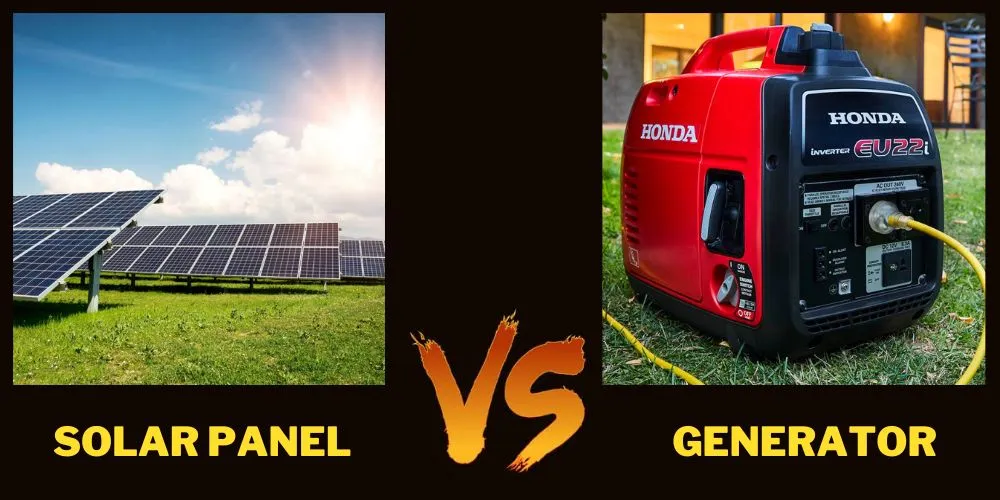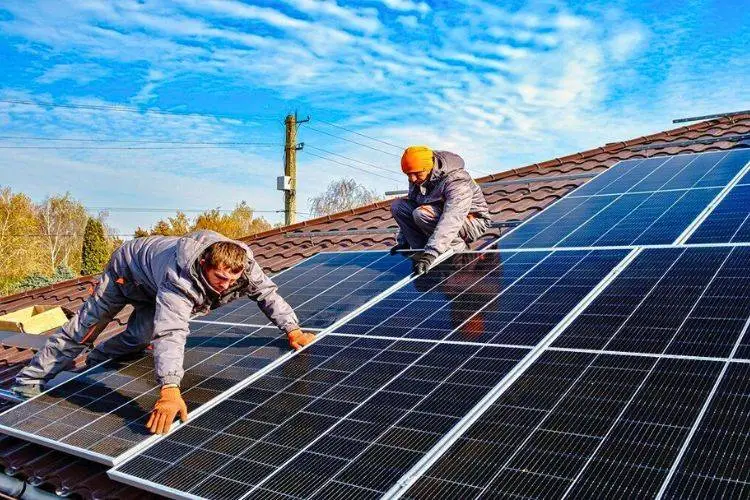The quest for sustainable and reliable energy sources has led to an ongoing debate between solar panels and generators.
As consumers weigh their options, understanding the nuances, strengths, and trade-offs of each is vital.
Here, we’ll delve into the critical aspects of solar panel vs generator comparison to guide you in choosing the appropriate power solution for your home.

In a world where power outages can be more than just inconveniences, the decision to invest in a home energy solution is significant.
Solar panels and generators stand out as two of the most popular choices, each with its own set of features and benefits.
Understanding what each technology offers is the first step in making an informed decision that aligns with your energy needs and environmental values.
What Are Solar Panels?
Solar panels harness the power of the sun to generate electricity. They’re composed of photovoltaic cells that convert sunlight into electrical energy.
The appeal of solar panels lies in their ability to produce clean, renewable energy.

By tapping into the sun’s abundant power, homeowners can reduce their reliance on traditional energy sources such as fossil fuels.
The benefits of solar panels extend beyond their environmental impact. They can lead to significant cost savings over time due to lower utility bills and government incentives for green energy solutions. Additionally, solar panels often enhance property value.
However, they’re not without their drawbacks. The initial cost of solar panel systems can be daunting, though this is often mitigated by long-term savings and financing options.
The efficiency of solar panels can also be influenced by geographical location, weather conditions, and the time of year.
What Are Generators?
Generators provide electricity by converting mechanical energy from external sources, typically fuel, into electrical power.
Gas, diesel, and propane are common fuel sources for generators, making them a versatile option for emergency power backup or in areas without reliable electricity access.

Generators are advantageous for their reliability and immediate power supply during outages. They come in various sizes and capacities, suitable for a range of applications, from small portable units for camping to larger, stationary units for home or industrial use.
Despite their utility, generators have limitations. They can be noisy, produce emissions, and require a consistent supply of fuel, which may not be feasible or cost-effective during prolonged periods of use.
Their maintenance needs can add another layer of expense and effort to their operation.
Solar Panel vs Generator
Cost Comparison
Upfront, solar panels generally have a higher cost than generators, attributed to the technology’s sophistication and installation expenses.
However, the maintenance and operational costs for solar panels are significantly lower than those for generators, which need regular fuel purchases and servicing. Over time, these savings can offset the initial investment in solar panels.
Energy Efficiency and Environmental Impact
Solar panels offer a clean, renewable energy source, significantly reducing the carbon footprint compared to generators that rely on fossil fuels. Generators emit greenhouse gases, contributing to pollution and climate change.
In terms of efficiency, solar panels convert sunlight directly into electricity without the energy loss associated with fuel-based power production seen in generators.
Reliability and Performance
Generators typically provide a consistent power output and can be relied upon during emergencies or when solar energy is insufficient.
Conversely, solar panels depend on sunlight, with their performance varying based on time of day, cloud cover, and other weather-related factors.
Nevertheless, advances in battery storage technology have improved the reliability of solar power systems by allowing energy to be stored for use when sunlight is not directly available.
Usability and Maintenance
Solar panels are known for their low maintenance requirements, needing only periodic cleaning to ensure peak performance.
Generators, on the other hand, demand regular upkeep, including oil changes and fuel replenishment.
The ease of installation for solar panels has improved over time, but it still requires professional involvement, whereas generators can be more readily installed and used.
Real-Life Applications
When assessing real-world applications of these power solutions, several factors come into play, such as location, intended use, and energy requirements.

Homes in sunny climates may benefit more from solar panels, whereas areas prone to natural disasters where immediate restoration of power is critical may favor generators.
Making the Right Choice for Your Needs
Determining the best fit between solar panels and generators involves an honest assessment of your energy needs. Factors such as energy consumption patterns, environmental priorities, and budget constraints should all be considered.
Moreover, if you are looking to reduce your carbon footprint, solar panels are the more eco-conscious choice.
For those living in remote or disaster-prone areas where consistent energy supply is critical, a generator may serve as a more reliable safeguard.
Incentives and rebates offered for solar energy installation can also be persuasive. It’s important to investigate local regulations and incentives that may affect the total cost and feasibility of solar panels for your home.
Frequently Asked Questions (FAQs)
Can solar panels provide enough power during an emergency?
Solar panels with sufficient battery backup can provide power during an emergency, but their output depends on sunlight and battery capacity.
How does weather affect solar panel and generator performance?
Adverse weather can reduce solar panel efficiency, while generators work reliably in most conditions but may be harder to refuel during severe weather.
What is the expected lifespan of solar panels versus generators?
Solar panels typically last 25-30 years with minimal maintenance, whereas generators have a shorter lifespan of around 10,000-30,000 hours of use, depending on maintenance.
Are there silent generators that can compete with the low noise levels of solar panels?
Yes, inverter generators are quieter than traditional generators but solar panels are virtually silent, as they have no moving parts.
Can solar panels and generators be used together?
Yes, combining solar panels with a generator can provide a reliable power system that uses solar energy primarily and a generator as backup.
Conclusion:
Deciding between solar panels and generators involves considering various factors, including cost, environmental impact, reliability, and location. Each option has its distinct advantages and limitations.
By evaluating your specific energy needs, the decision between solar and generator power can be clarified, leading to a choice that supports your lifestyle while aligning with your energy-efficiency goals.
